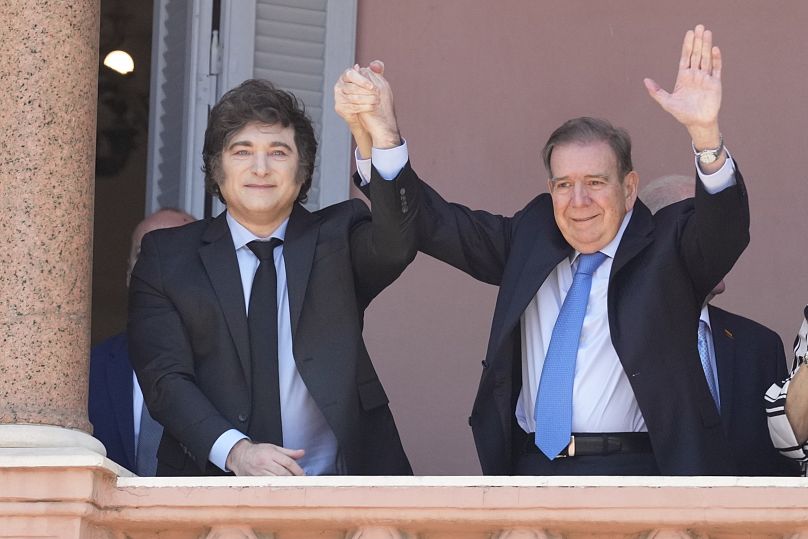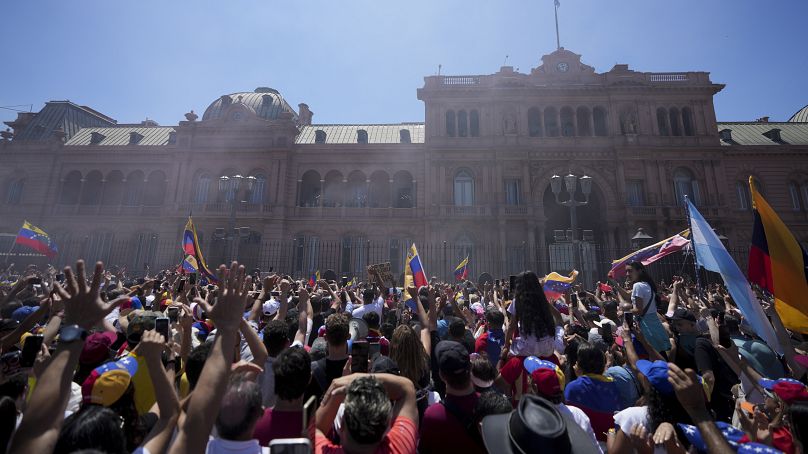Both president Nicolás Maduro and opposition leader María Corina Machado, who is currently in hiding, have urged their supporters to take to the streets on Friday.
Venezuelan leader Nicolás Maduro is expected to begin his third successive term as president on Friday, amid strong international condemnation of his authoritarian rule.
Following a dubious election victory in July, Maduro cracked down on mass protests that challenged the legitimacy of his government. More than 2,000 Venezuelans were arrested in the clampdown.
The opposition leader María Corina Machado, who is currently in hiding, has called on her supporters to take to the streets on Friday, when Maduro’s inauguration is due to take place.
It is important to show Maduro that his regime does not have the Venezuelan people’s backing, Machado has said.
“Maduro is not going to leave on his own, we must make him leave with the strength of a population that never gives up,” Machado said in a social media video over the weekend.
“Go outside, shout, fight. It is time to stand firm, and make them understand that this is as far as they go. That this is over,” she added.
Why was the 28 July election so controversial?
Unlike in previous votes, the Venezuelan electoral authorities did not publish detailed tallies after the 28 July election.
Instead, the National Electoral Council, which is stacked with Maduro loyalists, simply declared the incumbent president the winner with a reported 52% majority.
However, the opposition denied that the ruling United Socialist Party had won. To prove its point, it published tallies taken from more than 80% of the country’s electronic voting machines, which it said showed a large victory for its candidate, Edmundo González.
The US-based Carter Center, which observed the elections, has said the tally sheets are genuine.
Who is Edmundo González?
González, who until last year was an ex-diplomat with a low profile, stood as the opposition’s candidate in July’s election, after Machado was banned from competing.
The 75-year-old promised to restore a country that has been beset, in recent years, by deep economic woes. Almost 8m Venezuelans have left the country since Maduro took power in 2013, with daily life made difficult by food shortages, high inflation and political crackdowns.
González, who is widely believed to have won July’s election by a landslide, was forced to flee Venezuela in September after the Maduro regime issued a warrant for his arrest. He took refuge in Spain.
In exile, González accepted the Sakharov Prize on his and Machado's behalf late last year. The award is given by the EU to people who devote themselves to the defence of human rights and freedom of thought.
Shortly after receiving the prize, the 75-year-old told the Spanish newspaper El País that he did not see it as a personal recognition, but as something larger.
“I see it as an endorsement for a Venezuela which, for many years, was a beacon in Latin America, a light where human rights, freedoms, the separation of powers and all the variables that form part of a vibrant democracy shone,” he said.
González added that he would return to Venezuela to assume power on 10 January. However, it is not clear how the self-proclaimed president-elect will do so, as he faces arrest as soon as he touches Venezuelan soil.
“That unworthy being ... has been saying that he is going to return to the Bolivarian Republic of Venezuela,” National Assembly leader Jorge Rodríguez said in reference to him on Sunday.
“Each and every deputy who defends peace will request, if he touches a bit of land of the Bolivarian Republic of Venezuela, his immediate arrest," he added.
Last week, the Venezuelan authorities also announced a $100,000 (€96,110) reward for information leading to Gónzalez’s capture.
How do other countries view what has been happening in Venezuela?
Maduro has few allies, with many countries expressing concerns about the manner of his election victory in July. The US and many EU members are among those who have criticised his autocratic rule.
On Saturday, Javier Milei, the Argentinian president, welcomed González to the Casa Rosada in Buenos Aires. González, a former Venezuelan diplomat who twice served as his country's representative in Argentina, received honours usually assigned to a head of state.
Several hundred Venezuelas who had gathered outside shouted “Edmundo, Presidente” as the opposition candidate emerged from their meeting.
“We are doing whatever the cause of freedom requires,” Milei said of his support for the Venezuelan opposition.
As part of his international tour, González also stopped briefly in Uruguay, before travelling to the US, where he hopes to speak to the outgoing US President Joe Biden on Monday.
What can we expect to happen on Friday?
It is unclear whether Venezuelans will follow Machado’s encouragement to protest against Maduro on Friday, the day of his inauguration.
For its part, the Maduro regime has urged citizens to come out in support of him. Not everyone marching will be doing so for ideological reasons, however, as the government often forces public employees to participate in such demonstrations.













